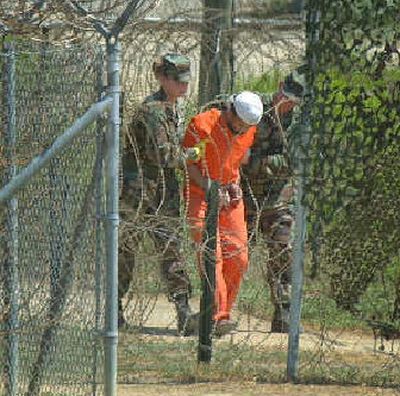Habeas corpus denial shocks legal experts

WASHINGTON – For almost eight centuries the “great writ” of habeas corpus has been a bedrock principle of English and American law, from the Magna Carta to today’s jails and courts. It’s the means for a prisoner to contest his imprisonment before a judge.
That’s one reason legal experts were stunned when the Senate, after an hour of debate, voted Thursday to overturn the Supreme Court’s extension of habeas corpus protection to 500-plus detainees at the Guantanamo Bay naval base in Cuba.
Opponents vowed Friday to fight the measure, and negotiators on the issue said the Senate may reconsider it early next week. The White House, which previously has opposed oversight of Guantanamo by Congress and the courts, supports the Senate action, spokeswoman Jeanie Mamo said Friday.
Under the provision, proposed by Sen. Lindsey Graham, R-S.C., suspected terrorists held at Guantanamo no longer would be allowed to challenge their detentions in federal court. Most of the detainees were captured in Afghanistan or Pakistan, and many have been held for nearly four years without charges.
The provision would reverse a 2004 Supreme Court decision that held that the detainees have the right to sue. Almost 300 detainees have filed petitions in U.S. district court in Washington since.
The Graham proposal also would block Monday’s Supreme Court decision to hear some detainees’ challenges to military trials set to be held at Guantanamo. It also would stop a case now being considered by the U.S. Court of Appeals on how habeas corpus cases should be handled.
In a brief interview Thursday after the 49-42 vote, Graham said his proposal was intended “to correct the balance” in how terror suspects should be treated – as enemy combatants, not as potential criminal defendants. He said the action was needed because Congress’ failure to set legal procedures for dealing with the detainees had forced the courts to step in.
“We’ve been chicken, to be honest, but now we’re trying to bring some clarity to the legal confusion,” said Graham. He said his proposal is part of a package with Sen. John McCain’s amendment – adopted by the Senate last month – to ban cruel and inhumane treatment of prisoners.
Many legal experts said the reach of Graham’s proposal was breathtaking.
The Senate is “trying to reverse a Supreme Court case of great magnitude and scuttle another one,” said Scott Silliman, a former Air Force lawyer who heads Duke University’s Center on Law, Ethics and National Security. “This is momentous.”
Even proponents of the administration’s position that Congress and the courts should stay out of the detainee issue expressed surprise.
“Stripping jurisdiction from the court after they have decided is far-reaching and, I think, premature,” said Lee Casey, a Washington attorney who worked in the administrations of Presidents Ronald Reagan and George H.W. Bush. “Congress can override the Supreme Court, but in this case I don’t consider it the right thing to do.”
Opponents are scrambling to overturn the Senate vote. Sen. Jeff Bingaman, D-N.M, is planning an amendment that would remove the habeas corpus provision from Graham’s proposal, and the Senate may take that up Monday.
John Hutson, a retired rear admiral and former judge advocate general of the Navy, is rounding up signatures from about 60 former officers who oppose the proposal.
The National Institute of Military Justice, a nonpartisan legal group, is also opposing the measure.
Opponents described the battle in dramatic terms.
“The conscience of our nation is up for grabs,” said Michael Ratner, whose Center for Constitutional Rights was the first group to challenge the Guantanamo detentions.